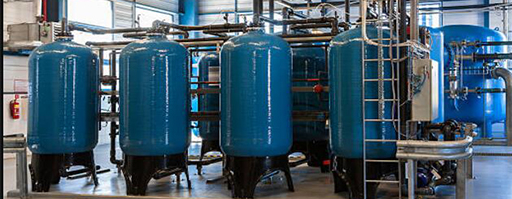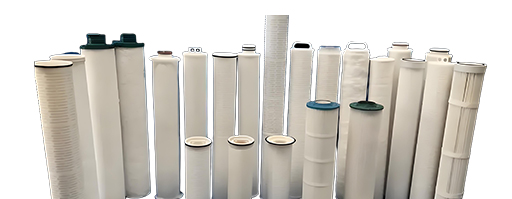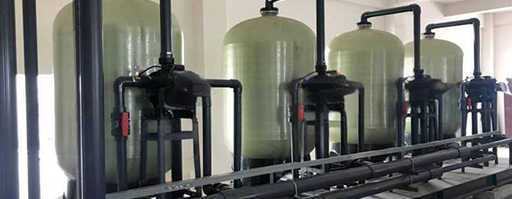Shallow Sand Filter: Achieving Operational Excellence in Steel Manufacturing Through Superior Water Filtration
Introduction
In the demanding environment of modern steel production, where precision engineering meets relentless operational cycles, water quality represents a critical variable in the success equation. The complex interplay between water purity and manufacturing efficiency has never been more pronounced, with contemporary steel facilities facing unprecedented challenges in maintaining consistent quality while optimizing resource utilization. Within this operational landscape, the Shallow Sand Filter emerges as a pivotal technological solution, engineered to address the multifaceted water treatment requirements of today's steel industry while delivering measurable performance advantages.

Navigating Water Treatment Complexities in Steel Production
The sophisticated ecosystem of steel manufacturing encompasses numerous processes where water quality serves as a fundamental determinant of success, influencing everything from equipment reliability to final product characteristics.
1. Advanced Thermal Regulation Systems
Contemporary steel production facilities employ intricate cooling architectures that demonstrate exceptional sensitivity to water composition. The progressive accumulation of microscopic particulates within cooling mechanisms can substantially degrade thermal transfer efficiency, resulting in elevated energy consumption and potential system compromises. Our advanced filtration methodology maintains precise water clarity standards, ensuring consistent thermal performance while optimizing energy utilization.
2. Manufacturing Process Water Standards
Multiple steel production phases, ranging from primary furnace operations to final finishing processes, require water meeting exacting quality parameters. Contaminant presence in processing water can significantly influence metallurgical reactions, impact material characteristics, and potentially compromise end-product specifications. The strategic implementation of precision filtration guarantees consistent water composition, supporting standardized manufacturing protocols and predictable production outcomes.
3. Asset Protection and Operational Reliability
Modern steel manufacturing infrastructure represents substantial capital investment, necessitating comprehensive protection against water-borne contaminants. Abrasive particulate matter and sedimentary accumulations can precipitate accelerated degradation in critical components including pumping systems, flow control mechanisms, and hydraulic assemblies, leading to increased maintenance demands and unplanned operational interruptions.
Technological Evolution in Sand Filtration Systems
The progressive development of sand filtration technology has yielded significant advancements in both operational efficiency and system reliability:
1. Revolutionary Filtration Architecture
Modern shallow bed configurations incorporate sophisticated hydrodynamic designs that facilitate optimal flow distribution throughout the filtration medium. This engineering innovation ensures complete utilization of filter bed capacity while maintaining consistent performance metrics across operational cycles.
2. Intelligent Monitoring and Control Systems
Current-generation systems feature advanced diagnostic capabilities, including continuous pressure differential analysis and responsive backwash initiation protocols. These smart system architectures optimize filtration performance according to real-time operational conditions, substantially enhancing efficiency while minimizing resource expenditure.
3. Adaptable Media Configurations
The versatility in filtration media selection enables customized solutions for specific water treatment challenges. Multiple media alternatives can be strategically configured to target particular contaminant profiles and concentration levels commonly encountered in steel production environments.
Strategic Implementation Framework
Successful filtration system deployment necessitates comprehensive planning and technical expertise:
1. System Specification Parameters
Appropriate system configuration requires detailed analysis of hydrodynamic characteristics, contamination profiles, and operational prerequisites. The inherently adaptable nature of shallow sand filters facilitates bespoke configurations that align with specific production requirements and spatial limitations.
2. Integration Protocol Development
Harmonious incorporation into existing water management infrastructures demands meticulous planning and specialized implementation. Our engineering team excels in creating integrated solutions that complement current systems while providing scalability for future expansion.
3. Operational Efficiency Enhancement
Modern systems incorporate energy-optimized components, water-efficient backwash technology, and automated control systems that reduce operational expenditures while maintaining performance benchmarks.
Comprehensive Value Proposition
The implementation of advanced filtration technology delivers substantial benefits across multiple operational dimensions:
1. Maintenance Optimization
Through effective contaminant elimination and equipment safeguarding, facilities experience significant reductions in maintenance frequency and component replacement costs.
2. Production Efficiency Maximization
Consistent water quality minimizes process variations and quality deviations, resulting in enhanced operational stability and manufacturing output.
3. Environmental Stewardship
Efficient water treatment supports regulatory compliance and conservation initiatives, contributing to sustainable manufacturing practices and ecological responsibility.

Forward-Looking Water Treatment Strategy
As steel production methodologies advance, water treatment requirements continue to evolve. Modern shallow sand filtration systems are conceived with adaptability as a core principle, capable of accommodating changing production demands and emerging water quality standards. The scalable nature of these systems permits future modifications as production requirements develop.
Conclusion: Strategic Water Management for Industrial Leadership
In the competitive arena of global steel production, investment in sophisticated water treatment technology represents a strategic imperative with comprehensive operational implications. The Shallow Sand Filter stands as a validated solution, delivering dependable performance, operational economy, and sustained value. By ensuring consistent water quality, steel manufacturers can protect vital assets, maintain production standards, and achieve significant competitive advantages.
Our organization maintains an unwavering commitment to technological innovation while providing end-to-end support from initial evaluation through system implementation and continuous maintenance. We invite steel producers to explore how modern shallow sand filtration can enhance their operational capabilities and support their strategic objectives in an increasingly competitive global market.













